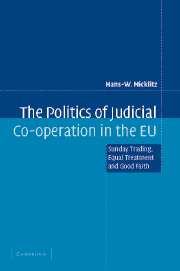Book contents
- Frontmatter
- Contents
- List of figures
- List of tables
- Preface and acknowledgments
- Table of cases
- Table of treaties
- Table of EC directives
- Table of statutes
- Table of statutory instruments
- List of abbreviations
- 1 Judicial activism and legal politics
- 2 The reconstruction of the Sunday trading cases
- 3 The reconstruction of the equal treatment litigation
- 4 The reconstruction of good faith in the control of unfair terms in consumer contracts
- 5 The limits of judicial activism and perspectives for legal politics
- Bibliography
- Index
1 - Judicial activism and legal politics
Published online by Cambridge University Press: 06 August 2009
- Frontmatter
- Contents
- List of figures
- List of tables
- Preface and acknowledgments
- Table of cases
- Table of treaties
- Table of EC directives
- Table of statutes
- Table of statutory instruments
- List of abbreviations
- 1 Judicial activism and legal politics
- 2 The reconstruction of the Sunday trading cases
- 3 The reconstruction of the equal treatment litigation
- 4 The reconstruction of good faith in the control of unfair terms in consumer contracts
- 5 The limits of judicial activism and perspectives for legal politics
- Bibliography
- Index
Summary
The purpose of this book
In legal literature, only a handful of books and articles endure for more than a relatively short period of time. Most are overtaken by the ever-growing volume of more recent literature, and are forgotten. In the area of law of interest to us here, two publications in particular deserve to be remembered. The first is Eric Stein's article, ‘Lawyers, Judges and the Making of a Transnational Constitution’, published in the American Journal of International Law in 1981. The second is Joel F. Handler's book, Social Movements and the Legal System: A Theory of Law Reform and Social Change, published in 1978. I had the privilege of meeting Professor Stein while I was a visiting professor at Michigan Law School. I took the opportunity of discussing with him the unique role of the European Court of Justice (ECJ) in transforming an international treaty system into a constitutional framework. I never met Professor Handler, but his book remains an impressive analysis of the use of rights and remedies in the US courts to establish civil rights, to establish environmental protection and to improve consumer protection.
These two publications formed the basis for my habilitation on an ‘International Product Safety Law’, in which I attempted to set out a theory on an ‘International Constitution for the Trade in Dangerous Products’. Here, I tested the judge-made EU constitution as a basis for action in the international arena.
- Type
- Chapter
- Information
- The Politics of Judicial Co-operation in the EUSunday Trading, Equal Treatment and Good Faith, pp. 1 - 42Publisher: Cambridge University PressPrint publication year: 2005



